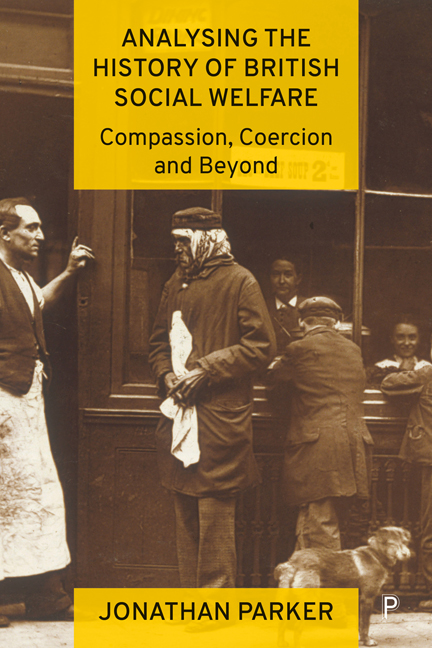Book contents
- Frontmatter
- Contents
- List of tables
- List of abbreviations
- About the author
- Acknowledgements
- 1 Concepts, continuities and critique
- 2 A brief history of British social welfare
- 3 Philosophical binaries and normative judgements
- 4 Chocolate, flowers and social welfare reform
- 5 War: the paradoxical crucible of welfare reform
- 6 Gendered perspectives on welfare
- 7 Piacular austerity: sacrificing the poor for the rich
- 8 Universal Credit versus Universal Basic Income: strange bedfellows?
- 9 Universal Credit versus Universal Basic Income: strange bedfellows?
- 10 W(h)ither welfare after Brexit and COVID-19?
- References
- Index
8 - Universal Credit versus Universal Basic Income: strange bedfellows?
Published online by Cambridge University Press: 20 January 2024
- Frontmatter
- Contents
- List of tables
- List of abbreviations
- About the author
- Acknowledgements
- 1 Concepts, continuities and critique
- 2 A brief history of British social welfare
- 3 Philosophical binaries and normative judgements
- 4 Chocolate, flowers and social welfare reform
- 5 War: the paradoxical crucible of welfare reform
- 6 Gendered perspectives on welfare
- 7 Piacular austerity: sacrificing the poor for the rich
- 8 Universal Credit versus Universal Basic Income: strange bedfellows?
- 9 Universal Credit versus Universal Basic Income: strange bedfellows?
- 10 W(h)ither welfare after Brexit and COVID-19?
- References
- Index
Summary
The inclusion of the word ‘universal’ in Universal Credit (UC) is a baffling misnomer that seems to represent a long-standing desire to simplify the administration and reduce the costs of social protection benefits within a system that can be applied to those eligible for receipt of such. The benefit is not universal and reflects the shift towards reinstating means-testing of benefits that has characterised the welfare state since its inception. The universal application of state provision is exemplified, however, by most proponents of a Universal Basic Income (UBI), something paid to everyone regardless of need, resource or status. This chapter will consider one of the ‘holy grails’ searched for throughout the history of British social welfare, the need to reduce administration and bureaucracy in social security and welfare. Alongside this, we will introduce and explore historical calls for (universal) basic income. These may seem a strange combination to debate together in the same chapter. However, our central concern lies with social security/social protection in general. We consider Poor Law dole and outdoor relief, alongside philosophical treatises on proto-basic income schemes to chart the twin aims that have often infused formal policy directions from both poles of the political spectrum: the need to simplify benefit systems and to find novel ways of ensuring a more equal or equitable distribution of income. Both desires are underpinned by political ideologies.
Universal Credit? Ways of reducing welfare administration to address poverty
UC was introduced to replace four other benefits and two tax credit schemes: Child Tax Credit; Housing Benefit (HB); Income Support; income-based Jobseeker's Allowance; income-related Employment and Support Allowance (ESA); and Working Tax Credit. It was meant to simplify the process and thereby reduce costs by replacing disparate benefits and systems by a single approach to welfare benefit (Gov.UK, nd). However, when it was implemented it was administered in different ways according to personal status and geography.
Citizens are eligible for UC if they are unemployed or in work but earning a low wage with the benefit tapering as more is earned.
- Type
- Chapter
- Information
- Analysing the History of British Social WelfareCompassion, Coercion and Beyond, pp. 135 - 148Publisher: Bristol University PressPrint publication year: 2023



